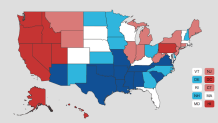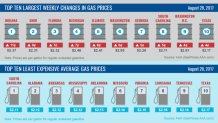The U.S. Energy Department announced Tuesday it will release half a million barrels of crude oil from the nation's Strategic Petroleum Reserve as Hurricane Harvey continued to wreak havoc on U.S. oil production and gas prices remained on the rise.
The supply — the first emergency release since 2012 — won't give drivers much relief at the pump ahead of the Labor Day holiday weekend, one of the top travel weekends of the year.
Retail gas prices in the U.S. climbed another 4 cents Thursday, and 10 cents in the past week to a national average of $2.449 per gallon, according to AAA. The automobile organization said that is one of the summer's largest one-week price surges.

In North Texas, drivers reported fuel prices as high as $8.02 per gallon, NBC DFW reported. Energy Secretary Rick Perry warned that states attorney generals would be on the watch against price gouging.
"Anybody that is considering raising prices above what would be considered to be appropriate needs to watch out," Perry said, according to a White House press pool report. "My hope is that every AG across the country will go after those people and go after them in a very hard way and harsh way."
Patrick DeHaan, an analyst for GasBuddy, predicts that U.S. gasoline prices will top out around $2.50 or $2.55 a gallon, an increase of up to 20 cents since Harvey hit, with bigger spikes closer to the Gulf.

"In terms of product price increases, it might get worse before it gets better," Rob Smith, an energy analyst with IHS Markit, told The Associated Press.
U.S. & World
It could take two weeks or longer before big refineries in the Houston area can recover from a record-setting deluge and resume normal operations, assuming they didn't suffer serious damage, which is still unknown.
With Americans using about 9.7 million barrels per day of gasoline, the threat of a fuel supply crunch has grown as the storm and flooding in Harvey's aftermath brought a huge chunk of U.S. oil production and refining capacity to a halt.
As of Thursday, some 15 refineries representing about 25 percent of U.S. refining capacity were offline from Corpus Christi, Texas, to Port Arthur, Texas, the Energy Department reported. That includes Motiva Enterprises, the nation's biggest refinery, which announced Wednesday it would begin a "controlled shutdown."
As a result of the outages, major pipelines began to close lines outright because of a lack of supply. On Thursday, Colonial Pipeline shut down a crucial artery in the nation's fuel supply network that provides more than 3 million barrels of diesel, gasoline and jet fuel daily to major cities from Houston to New York.
[NATL] Harvey Heroes: A Look at Rescue Efforts by Civilians, First Responders During Floods
Half of the 26 refineries that connect to Colonial's pipeline system are between storm-ravaged Houston and Lake Charles, which is just east of the Beaumont-Port Arthur metro area, the AP reported. Colonial did not indicated how long it expects the closure to last.
"Once Colonial is able to ensure that its facilities are safe to operate and refiners in Lake Charles and points east have the ability to move product to Colonial, our system will resume operations," the company said in its statement.
The Department of Energy hopes the release of 500,000 barrels of reserve crude will offset the fuel shortage and stabilize prices. The SPR, established in the 1970s, currently contains 679 million barrels of oil.
"The Department will continue to provide assistance as deemed necessary, and will continue to review incoming requests for SPR crude oil," the department said in a statement.
The crude is headed to Phillips 66′s refinery in Lake Charles, Louisiana, one of the few refineries in the Gulf Coast that has not been affected by the storm.



